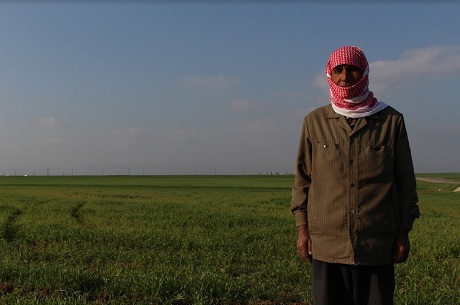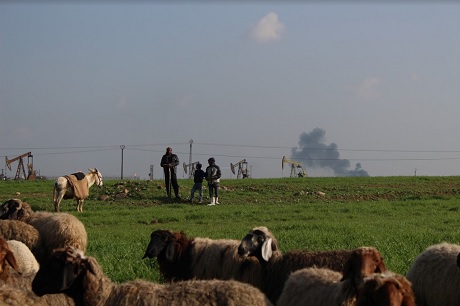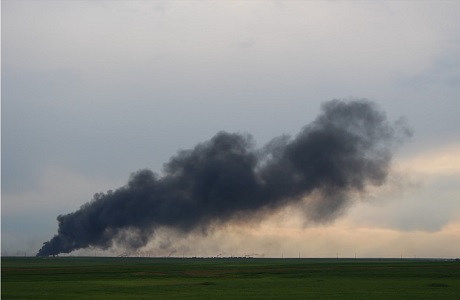NEAR KAHTANIEH, Syria – Black clouds hang over Rojava, and not just figuratively. The Kurdish-led administration is well aware its ramshackle oil refineries are polluting the air, soil, and water, but officials say it lacks the money and expertise to clean them up or to find alternatives.
“When we wake up in the morning, we smell the bad smoke. It used to be we would wake up and it smelled good and clean,” said 62-year-old farmer Abid Ramadan Mohammed.
 Farmer Abdi Ramadan stands in his wheat field east of Qamishli, February 18, 2019. Photo: Hannah Lynch / Rudaw
Farmer Abdi Ramadan stands in his wheat field east of Qamishli, February 18, 2019. Photo: Hannah Lynch / Rudaw
A slim man with his head wrapped in a red and white checkered jamana (scarf), Mohammed has farmed this land passed down from his father for forty years. He says smoke from the nearby refinery is a big concern. It has given his crops a yellow hue.
That smoke is also a worry for shepherd Hussein, who declined to give his last name.
He spent a lot of money last year on feed for his sheep and goats because of the poor harvest. This year, the 27-year-old is happy with the thriving barley yield, which is providing ample food for his animals, but is worried about contamination from the smoke and oil seeping into the soil.
As he watches his sheep and goats lazily munch on green barley shoots, a cloud of black smoke rises ominously on the horizon behind him from the nearby refinery.
 Black smoke rises behind shepherd Hussein (L) and his flock east of Qamishli, February 18, 2019. Photo: Hannah Lynch / Rudaw
Black smoke rises behind shepherd Hussein (L) and his flock east of Qamishli, February 18, 2019. Photo: Hannah Lynch / Rudaw
The refinery is composed of a series of tanks and pits stretched along a dirt road, surrounded by green fields. Flare stacks burn off excess gas – a fairly recent development introduced to minimize toxic emissions – while fires simmer, sending plumes of white, grey, and black smoke into the air.
Their product is tested daily for quality. They are also inspected every two or three months for safety, mainly for radiation emissions, explained Bijwar Suleiman, a petroleum engineer who owns the refinery.
He knows the operation is an environmental hazard, but “what can we do?” asked Ahmed Suleiman, an oil engineer and relative who was visiting the refinery.
This is a serious dilemma in Rojava – a quasi-state surrounded by hostile neighbours and dependent on the charity of outsiders.
The Kurdish-led administration of northern Syria controls a third of the country, including the oil fields of Hasaka and Deir ez-Zor. It sells some to Damascus, which itself maintains some refinery operations within Rojava. But the autonomous administration needs to refine crude itself to meet domestic demand.
This started with ad-hoc roadside operations that sprung up in 2012. Oil was refined in pits dug mere centimeters from the pavement, belching toxic smoke directly over the population.
Video supplied by Luqman Ahmi
Rojava’s domestic oil refining began with roadside operations like this. With no regulation, they polluted the environment and damaged the health of workers.
Fixing this problem is Luqman Ahmi’s mission.
Ahmi became interested in environmental issues during his student days, studying oil engineering and after witnessing firsthand the havoc the sector wreaked on the land and water. He founded Rojava’s Green Party in 2013. It is a member of the Syrian Democratic Council (SDC).
He lobbied to minimize the damage caused by the oil refineries, acknowledging that eliminating the problem was not immediately possible.
Rojava needs gasoline and diesel. Domestic production is the only option. Turkey is hostile to the Kurdish administration, so trade across that border is impossible. Trade across the border with the Kurdistan Region of Iraq, meanwhile, waxes and wanes depending on the political atmosphere.
Rojava has some trade with the Syrian regime, but the price of petrol in the autonomous region is a fraction of what it is in the rest of the country – roughly 75 Syrian pounds ($0.15) per liter, as opposed to 300 pounds ($0.58) per liter in regime areas.
When the average monthly salary is just a few hundred dollars, keeping necessities affordable is crucial. Rojava is also worried about potential blockades causing shortages if it finds itself dependent on Damascus.
Bijwar Suleiman said they recently expanded operations because demand is so high. Not only are they providing vital gasoline at a reasonable price, they are also creating jobs, he said.
Surrounded by states who would not hesitate to impose a siege, fostering self-sufficiency is equally vital.
 A black cloud of smoke rises from an oil refinery east of Qamishli, February 22, 2019. Photo: Hannah Lynch / Rudaw
A black cloud of smoke rises from an oil refinery east of Qamishli, February 22, 2019. Photo: Hannah Lynch / Rudaw
Establishing a modern refinery themselves requires the funds and ability to import equipment and expertise. Rojava does not have that, explained Berivan Umer, assistant manager for the environment at the Municipality Ministry of Jazira canton.
“We have projects, but we don’t have enough funds necessary to pay for them,” she said.
So Rojava has to make do. Doing so with the least damage to the environment is Ahmi’s goal. At his insistence, the refineries were removed from their roadside pits two years ago and collected into selected spots far from urban centers – dropped into the middle of farmers’ fields.
“There were fears, and there are still fears, but our hand was forced. We had a choice – we either stop [refining oil], without which life would stop, or we continue, but with less damage,” said Ahmi.
In another sign of progress, the Rojava government says it will plant trees around the refineries in a bid to further minimize their effect on the surrounding fields and population.
With so many immediate threats to its political and economic survival, the Rojava government has not been able to prioritize the environment.
Green shoots of reform will come as a positive sign for the rural families living in the shadow of Rojava’s belching refineries. But unless the Rojava administration secures its long term future, these projects will likely go up in smoke.
“When we wake up in the morning, we smell the bad smoke. It used to be we would wake up and it smelled good and clean,” said 62-year-old farmer Abid Ramadan Mohammed.
 Farmer Abdi Ramadan stands in his wheat field east of Qamishli, February 18, 2019. Photo: Hannah Lynch / Rudaw
Farmer Abdi Ramadan stands in his wheat field east of Qamishli, February 18, 2019. Photo: Hannah Lynch / RudawA slim man with his head wrapped in a red and white checkered jamana (scarf), Mohammed has farmed this land passed down from his father for forty years. He says smoke from the nearby refinery is a big concern. It has given his crops a yellow hue.
That smoke is also a worry for shepherd Hussein, who declined to give his last name.
He spent a lot of money last year on feed for his sheep and goats because of the poor harvest. This year, the 27-year-old is happy with the thriving barley yield, which is providing ample food for his animals, but is worried about contamination from the smoke and oil seeping into the soil.
As he watches his sheep and goats lazily munch on green barley shoots, a cloud of black smoke rises ominously on the horizon behind him from the nearby refinery.
 Black smoke rises behind shepherd Hussein (L) and his flock east of Qamishli, February 18, 2019. Photo: Hannah Lynch / Rudaw
Black smoke rises behind shepherd Hussein (L) and his flock east of Qamishli, February 18, 2019. Photo: Hannah Lynch / RudawThe refinery is composed of a series of tanks and pits stretched along a dirt road, surrounded by green fields. Flare stacks burn off excess gas – a fairly recent development introduced to minimize toxic emissions – while fires simmer, sending plumes of white, grey, and black smoke into the air.
Their product is tested daily for quality. They are also inspected every two or three months for safety, mainly for radiation emissions, explained Bijwar Suleiman, a petroleum engineer who owns the refinery.
He knows the operation is an environmental hazard, but “what can we do?” asked Ahmed Suleiman, an oil engineer and relative who was visiting the refinery.
This is a serious dilemma in Rojava – a quasi-state surrounded by hostile neighbours and dependent on the charity of outsiders.
The Kurdish-led administration of northern Syria controls a third of the country, including the oil fields of Hasaka and Deir ez-Zor. It sells some to Damascus, which itself maintains some refinery operations within Rojava. But the autonomous administration needs to refine crude itself to meet domestic demand.
This started with ad-hoc roadside operations that sprung up in 2012. Oil was refined in pits dug mere centimeters from the pavement, belching toxic smoke directly over the population.
Video supplied by Luqman Ahmi
Rojava’s domestic oil refining began with roadside operations like this. With no regulation, they polluted the environment and damaged the health of workers.
Fixing this problem is Luqman Ahmi’s mission.
Ahmi became interested in environmental issues during his student days, studying oil engineering and after witnessing firsthand the havoc the sector wreaked on the land and water. He founded Rojava’s Green Party in 2013. It is a member of the Syrian Democratic Council (SDC).
He lobbied to minimize the damage caused by the oil refineries, acknowledging that eliminating the problem was not immediately possible.
Rojava needs gasoline and diesel. Domestic production is the only option. Turkey is hostile to the Kurdish administration, so trade across that border is impossible. Trade across the border with the Kurdistan Region of Iraq, meanwhile, waxes and wanes depending on the political atmosphere.
Rojava has some trade with the Syrian regime, but the price of petrol in the autonomous region is a fraction of what it is in the rest of the country – roughly 75 Syrian pounds ($0.15) per liter, as opposed to 300 pounds ($0.58) per liter in regime areas.
When the average monthly salary is just a few hundred dollars, keeping necessities affordable is crucial. Rojava is also worried about potential blockades causing shortages if it finds itself dependent on Damascus.
Bijwar Suleiman said they recently expanded operations because demand is so high. Not only are they providing vital gasoline at a reasonable price, they are also creating jobs, he said.
Surrounded by states who would not hesitate to impose a siege, fostering self-sufficiency is equally vital.
 A black cloud of smoke rises from an oil refinery east of Qamishli, February 22, 2019. Photo: Hannah Lynch / Rudaw
A black cloud of smoke rises from an oil refinery east of Qamishli, February 22, 2019. Photo: Hannah Lynch / RudawEstablishing a modern refinery themselves requires the funds and ability to import equipment and expertise. Rojava does not have that, explained Berivan Umer, assistant manager for the environment at the Municipality Ministry of Jazira canton.
“We have projects, but we don’t have enough funds necessary to pay for them,” she said.
So Rojava has to make do. Doing so with the least damage to the environment is Ahmi’s goal. At his insistence, the refineries were removed from their roadside pits two years ago and collected into selected spots far from urban centers – dropped into the middle of farmers’ fields.
“There were fears, and there are still fears, but our hand was forced. We had a choice – we either stop [refining oil], without which life would stop, or we continue, but with less damage,” said Ahmi.
In another sign of progress, the Rojava government says it will plant trees around the refineries in a bid to further minimize their effect on the surrounding fields and population.
With so many immediate threats to its political and economic survival, the Rojava government has not been able to prioritize the environment.
Green shoots of reform will come as a positive sign for the rural families living in the shadow of Rojava’s belching refineries. But unless the Rojava administration secures its long term future, these projects will likely go up in smoke.



Comments
Rudaw moderates all comments submitted on our website. We welcome comments which are relevant to the article and encourage further discussion about the issues that matter to you. We also welcome constructive criticism about Rudaw.
To be approved for publication, however, your comments must meet our community guidelines.
We will not tolerate the following: profanity, threats, personal attacks, vulgarity, abuse (such as sexism, racism, homophobia or xenophobia), or commercial or personal promotion.
Comments that do not meet our guidelines will be rejected. Comments are not edited – they are either approved or rejected.
Post a comment